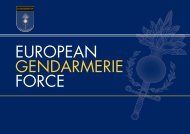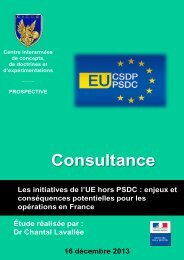Conference
science-research-bulletin-2013-conference
science-research-bulletin-2013-conference
You also want an ePaper? Increase the reach of your titles
YUMPU automatically turns print PDFs into web optimized ePapers that Google loves.
EUROPEAN POLICE SCIENCE AND RESEARCH BULLETIN<br />
SPECIAL CONFERENCE EDITION<br />
nevertheless considers the attached challenges<br />
and risks of the situation. In consequence he calls<br />
for a research initative how quality police training<br />
and education for the police could be salvaged in<br />
times of constant austerity.<br />
One example what could be done on an<br />
internationally aggregated level is what Barbara<br />
Rohmann describes UNICRI has developed and<br />
achieved in regard to providing support and<br />
training for the security planning of major public<br />
events.<br />
That police work is a stressful occupation, is often<br />
taken for granted. It is also unlikely that austerity<br />
measures will reduce stress-levels for individual<br />
officers. In view of this situation, Marianne Kaiseler,<br />
Christina Queirós and Susana Rodrigues offer an<br />
innovative method to measure occupational<br />
stress levels among officers in a comparative<br />
international approach.<br />
Marisa Silvestri examines the outlook of women’s<br />
careers in policing under the prefix of organisational<br />
and political austerity measures. Although<br />
she recognises a cultural change of policing<br />
philosophies and strategies affiliated with the rise<br />
of numbers in female officers, she is less optimistic<br />
that this tendency will continue in times of severe<br />
economic constraints in public expenditure.<br />
When it is all about change management – what<br />
is possible in police organisations, which have a<br />
general reputation to be aversive to change?<br />
Finding out about effective change management<br />
on a European level – that is the exact topic of a<br />
paper by Natalie Hirschmann and Jochen Christe-<br />
Zeyse, describing in a nutshell the structure and<br />
findings of the comparative Composite project.<br />
Among other relevant preliminary outcomes and<br />
conclusions of this cross-European project the most<br />
striking one is that police cultures and practices are<br />
not the same anywhere, thus a serious caution is<br />
put on the “best-practice-to-be-copied”-approach.<br />
CONCLUDING NOTE<br />
The papers collected in this special conference edition of the European Police Science and Research<br />
Bulletin are a selective, but authentic representation of the wealth of information and science- based<br />
insights that were exchanged among the participants on the days of the conference in Münster. The<br />
conference discourse was certainly dynamic, during the sessions and continuing in the coffee breaks<br />
and meals, when reactions to the presentations were traded among attending police officers, academic<br />
scholars and police educators. One of course could have expected a multiplicity of standpoints and<br />
perspectives, when experts and participants from more than two dozen countries in Europe and from<br />
overseas are invited to consider and to discuss a complex issue like “policing civil societies in times of<br />
economic constraints”.<br />
When talking about contemporary crisis-situations, it will always be very difficult to ascertain, if the<br />
crisis is already past its peak and will be over soon, or if it is going to get worse, before it becomes<br />
better. In any case, it is a feature of hypermodern societies, that the search for solutions and remedies<br />
will not stop – but there will certainly be no lasting results before a thorough and adequate analysis<br />
has taken place. This is the role of scientific research.<br />
While the conference contributions were strong on analysis, there were also plenty of research-based<br />
and science-inspired hints and directions, where policing and related training and education for it<br />
shall go next. A satisfactory conference experience for some is to leave with new answers and inspired<br />
ideas – for others it is to go home with new and challenging questions. The conference organisers<br />
and editors of this volume trust that the 2013 CEPOL Annual European Police Research and Science<br />
<strong>Conference</strong> delivered to both ends.<br />
Finally the editors would like to remind the readers that the presentation files and video recordings<br />
of even more speakers and contributions are available from the public CEPOL website and the CEPOL<br />
eNet for registered users. With the publication of the conference content, sharing it with a wider<br />
interested public, the European Police College and its network partners in the EU member states<br />
underpin their commitment to facilitate the further development of police science in Europe and by<br />
that fostering good policing to all citizens.<br />
7





